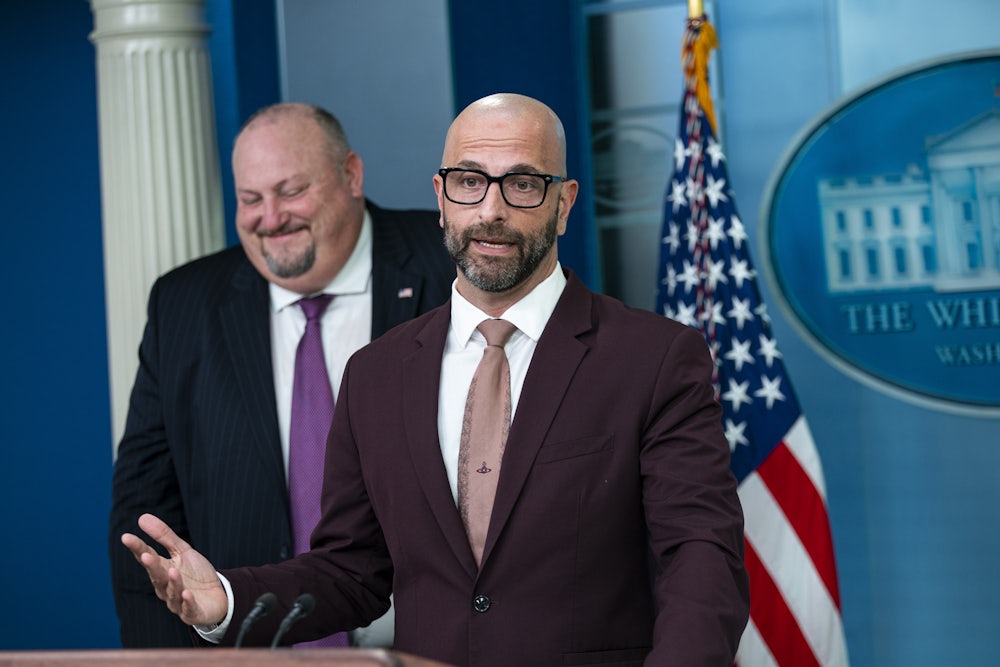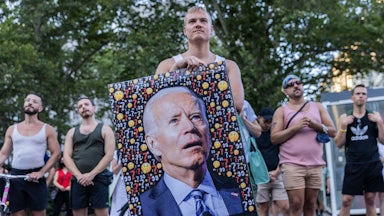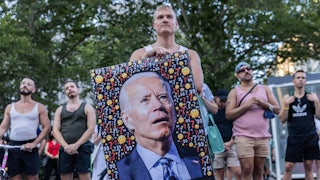This past July, Bob Fenton Jr., a career government official with the Federal Emergency Management Agency, got a call from Department of Homeland Security Secretary Alejandro Mayorkas. Mayorkas wanted to know if Fenton might possibly be able to run the Biden administration’s response to the monkeypox outbreak. Fenton, who has worked at top posts at FEMA under Democratic and Republican presidents (including Donald Trump), told the secretary, “The last two initials on my name are Jr., not M.D. To be successful, I need to be really teamed up with someone who is really knowledgeable from” the LGBTQ community that has been hit hard by the virus.
Fenton ended up getting paired with Dr. Demetre Daskalakis (he prefers to be called Dr. Demetre), a Columbia- and Harvard-educated physician who spent much of his career spearheading efforts to fight the HIV pandemic in New York City and at the Centers for Disease Control and Prevention.
Fenton and Daskalakis are the White House’s point men in fighting one of the two major viral outbreaks the Biden administration has had to deal with. The monkeypox outbreak, although different from the Covid-19 pandemic, has led to about 23,000 cases in the United States and three times as many around the globe, according to the CDC. Four months since it emerged, the clip of cases is slowing down a bit, but health officials still don’t know all they need to know about the virus and can’t definitively say the exact reason why it is subsiding.
Monkeypox is a virus similar to (though less severe than) smallpox, which seems to spread through close sexual contact. The symptoms include painful rashes, body aches, and a fever. It was first identified in 1958, according to The New York Times, and has been endemic in Africa. In the past, outbreaks have not been very large, with only a few cases.
The worst previous outbreak in the U.S. was in 2003 with a few dozen cases. But this year is different. According to the CDC, in 2022 there have been 62,406 cases globally and 23,893 in the U.S. There has been one death in the U.S.
When the White House announced in early August that Fenton and Daskalakis would lead the Biden administration’s response to monkeypox, cases and emergencies were surging.
The common critique among public health care officials I talked to was that the Biden administration was slow in responding to the monkeypox outbreak.
“They were moving slowly in the beginning, and there were definitely missteps,” said Dr. Justin Feldman, an epidemiologist who ran the Division of Epidemiology at New York University School of Medicine’s Department of Population Health from 2018 to 2020. Feldman said overall the response doesn’t seem so bad because cases have declined considerably in big cities recently. Still, Feldman said, “There was a lot of red tape around testing, around TPOXX—the medical treatment—and people still aren’t necessarily able to get that, but it seems like more of an issue with providers and the federal bureaucracy than the federal response per se.”
There are also still a lot of unknowns about the virus, public health experts caution. “We still don’t know if the vaccine works or not. We don’t have any data,” said Dr. Carlos del Rio, who runs the Division of Infectious Diseases at the Emory University School of Medicine. “We need data that the treatments actually do what they’re supposed to do. There’s a lot of scientific questions that need to be answered.”
Biden administration officials are quick to argue that since Fenton and Daskalakis started, in the words of one administration official, “We significantly ramped up vaccine supply, distribution, and information going out to high-risk communities.”
This past weekend, President Biden said in an interview with 60 Minutes that the Covid pandemic is effectively over. He has made no such pronouncement about monkeypox. Monkeypox cases in the U.S. have dropped by roughly 25 percent in the last fortnight, according to The Washington Post. Cases globally fell by slightly less than that, according to data from the World Health Organization. At the same time, the availability of monkeypox vaccines and tests has been limited around the world.
The Biden administration has sought additional funding to fight the monkeypox outbreak, but Republicans have signaled reluctance to support more public funding on this.
Fenton and Daskalakis share a common mission of leading the White House’s response to the virus and keeping the downward trend in the right direction. Beyond that, they don’t have much else in common. Fenton has spent his career working for FEMA. Daskalakis has been a career public health official and physician. Fenton is six feet, three inches tall, 300 pounds; he played football at the University of California, Davis, before doing some professional football in Europe. Daskalakis is thin and buff and poses regularly for photos showing off his heavily tattooed torso.
When the two were guests at the White House press briefing earlier this month, Fenton, shoulders slightly hunched forward in a black suit jacket, stuck to a script of prepared remarks in front of the press. When it was Daskalakis’s turn, he took the podium in a trim maroon suit and answered complex questions on the epidemic without looking down at any paper.
At one point during that press conference, Daskalakis got the core question looming over his and Fenton’s job right now: Is their job to eradicate monkeypox or try to contain it, like Covid has been contained (to an extent)? “Our goal is to really control this outbreak in the U.S.,” he answered.
The two have spearheaded the White House’s pilot programs to increase availability of the monkeypox vaccine at places like gay pride events over the summer and fall. According to a White House official, over “10,000 people who wouldn’t have gotten vaccinated got vaccines through those large events, and many were provided information through the CDC and administration efforts on how to protect themselves.”
In an interview earlier this month at the Eisenhower Executive Office Building, the two laid out some of the similarities and differences.
“We’re living the exact same tale with Covid,” Daskalakis said. “We’ve got the early adopters done, and we’ve launched a bunch of equity interventions that are … bringing the vaccine closer to humans, as opposed to humans trying to find the vaccine.”
As with Covid, Daskalakis and Fenton are having to fight skepticism to the monkeypox vaccine among at-risk communities. A big part of their job has just been figuring out ways to share information on its availability.
The response to the Fenton and Daskalakis pairing has been dramatically different from, say, the rage conservatives spouted toward Anthony Fauci. But Daskalakis has taken his share of pot shots from right-wing trolls. He’s certainly not the shy type. His Instagram, which is now private, is a long collection of those shirtless pictures of himself. (Fenton, by contrast, is more of a LinkedIn guy.) When Daskalakis served as New York City’s assistant health commissioner, where he led the department’s HIV/AIDS bureau, he marched in a New York City Pride parade in a leather mesh shirt. Notorious right-wing provocateurs like Benny Johnson have tried to demonize him as a “satanist” because of some of his tattoos (he is not a Satanist). Daskalakis always laughs off such absurd suggestions.
“I am certainly not a satanist,” Daskalakis told The Advocate. When the newspaper asked why people seem to think that, the physician responded mischievously, “It’s because I wear high-fashion harnesses by Zana Bayne.”
In 2014, the New York Post also published an article about the gothic spin studio founded by Daskalakis, his husband, and one other person. Daskalakis got his undergraduate degree from Columbia University, where he majored in religion and biology. He went on to get his medical degree from Harvard and do an infectious disease fellowship at Massachusetts General Hospital.
While he was doing lab work during his infectious disease fellowship, an HIV case of rapid progression with multidrug resistance caught his attention. “I was in the lab going, ‘Have I lost my path? I’m supposed to be working in that community in New York City. Why am I here?’” he recalled. So Daskalakis moved to NYU’s Bellevue Hospital as an attending physician in clinical trials. “I landed there,” he said, “and it ended up that they found out that that case of HIV was acquired in a sex club. So I was like, ‘Well, I’m going to start doing HIV testing in the sex club,’ because that’s where this person had it.”
Daskalakis was the first person in the city to start testing in those venues. “I started this project in a couple of venues, and I showed really good data,” he recounted. “Twelve percent of people that I had tested had never been tested or had never tested positive before, and they were positive, so that’s very high. That’s like sub-Saharan [Africa] positive high.”
From there, Daskalakis got funding from NYC’s Department of Health to set up clinical spaces. “So I had two clinics running out of sex clubs in New York City doing HIV and [sexually transmitted infections] testing,” Daskalakis said.
As you may have surmised by now, Fenton is, by far, the lower profile of the two men. I first heard about Fenton in 2021 when I was looking to write about FEMA. When I started asking around about who might be a good person to profile to understand the best of the agency’s work, every single person I talked to pointed me to Fenton. He is something of a legend in the FEMA community, having worked in Hawaii, Mississippi, and Louisiana, among other places, over almost three decades. He sort of fell into FEMA first by working for a company that provided water supplies to fire departments. That led him to helping to distribute water to refugees in Rwanda. He had to leave the country because of the genocide, and he was encouraged by friends at USAID to join FEMA. His first deployment opportunity was to Hawaii, which had just suffered a severe storm that merited a presidential disaster declaration. Since then he’s worked for FEMA on some of the country’s biggest domestic disasters, in places like Louisiana and Mississippi.
When I asked Fenton the difference between dealing with a natural disaster at FEMA and an infectious disease like Covid or monkeypox, he said it was about building trust. “So what we did [on] Covid is leverage the faith-based organizations versus now, [where] we’re leveraging many of the gay communities who are out there for ‘How do we build trust with the community most at risk in this event?’” Fenton said. “And a lot of the relationships that Dr. Daskalakis has [are] helping with that and the communications with that.”
The division of labor between Fenton and Daskalakis is unsurprising based on their skill sets. Fenton’s work at FEMA makes him a logistics expert. “I kind of run how we operate,” Fenton said, before describing the logistical aspects of the job, like coordinating with state and local officials.
Daskalakis’s past is basically the other side of the monkeypox response coin: He has extensive experience fighting diseases ravaging the LGBTQ community. There will be times when Daskalakis will share a medical paper or scientific findings with Fenton. Fenton, on the other hand, will “explain the supply chain” to Daskalakis. “I think where Demetre comes into the equation is he’s a trusted member of the community most at risk and has a lot of knowledge of programs and resources being used for that,” Fenton said.
If the monkeypox virus didn’t exist, it’s more than just possible these civil servants would not have met. The fact that these two are working together is a sign of how the Biden administration has learned to deal with deadly virus outbreaks—as both a logistical matter and a serious medical manner. With that approach, Daskalakis and Fenton have a lot in common. They now also share the challenges public health and emergency management officials face with any serious viral outbreak: rushing to understand the disease and operating with the knowledge that any signs of improvement could simply be red herrings that disappear quickly.
“The decline in numbers—it doesn’t mean that the risk is gone and the outbreak is over,” said Dr. Preeti Malani, professor of medicine at the University of Michigan’s Division of Infectious Diseases. “But the overall curve is changing. But just one city could change that.”










